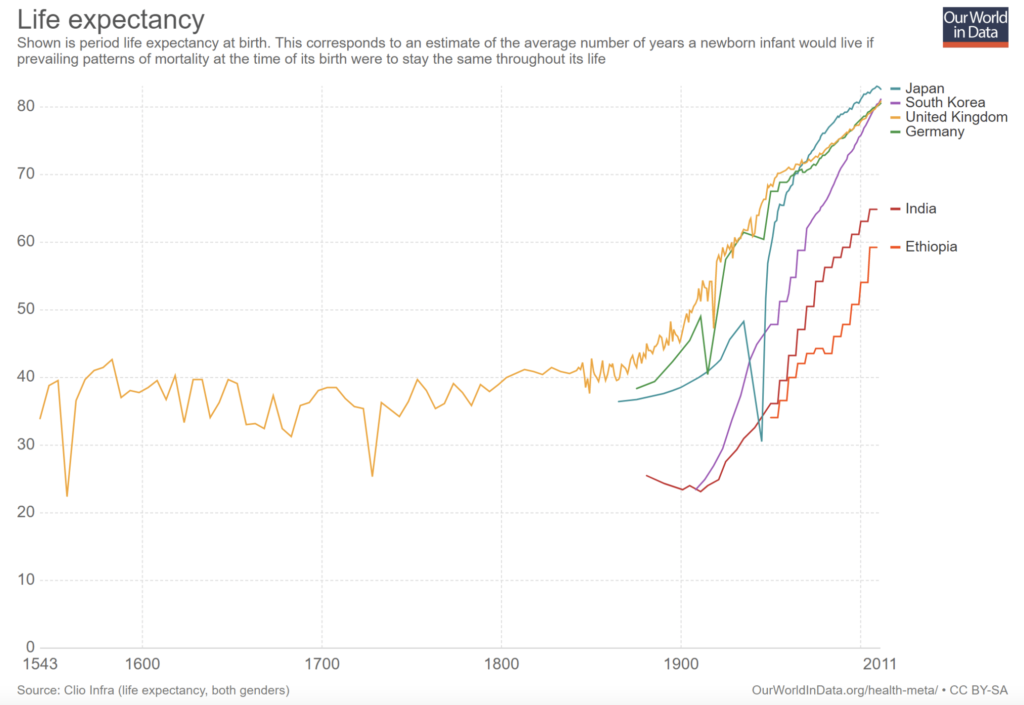How long do you want to live?
It is quite common to receive a „Get real!“, when talking about a life expectancy that goes into the three digits. The mental frameworks most people subscribe to in our world today are frameworks defining limits. This is not new. Throughout history the large majority of people has always preferred or chosen to rather create a framework of self-limitation, rather than trying to stretch the limits of their world or even discover completely new worlds. Remember the following „solid truths“ that people took for granted and didn’t even bother to questions or challenge:
- „The world is a disk. If you are going too far on the ocean, you will fall off.“
- “There is nothing new to be discovered in physics now. All that remains is more and more precise measurement.” (Lord Kelvin, 1900)
- “There is no reason anyone would want a computer in their home.” (Ken Olsen, founder of Digital Equipment Corporation, 1977)
Similar limiting beliefs apply today when it comes to aging. We are supposed to believe that it is an unchangeable law that humans should retire at the age of 60 or 65, „enjoy their life“ until 75 or maybe 85 … and then die. Is this truly a law, cast in stone? Assuming it is, we are being limited to believe whatever we do, will not have any significant effect on our own life expectancy. Isn’t this a rather fatalistic view of life?
However, there are a number of indications that this is not true.
1. Average Life Expectancy
The number of years humans can expect to walk on earth has increased considerably since 1543 as shown in this diagram, published by Riley 82005), Clio Infra (2015) and the UN Population Division (2019). Even in countries with low life expectancy, like Ethiopia or South Africa, people live on average almost twice as long as people in the UK throughout the 16th, 17th, 18th and 19th century. There are a number of factors that had a significant impact on life expectancy in prior centuries, like malnutrition, wars, infections, etc. . However, so far there is no significant flattening of the curves in this diagram. Life expectancy does continuously go up!

2. Factors affecting life expectancy
Science continues to improve our understand of the inner workings of our bodies and the factors leading finally to our death. The better understanding of illnesses, like cancer or cardiovascular disease resulted in new treatments and achieved significant improvements in life expectancy. But scientific discovery has not stopped there and is not only considering treating the symptoms. Our understanding of the inner workings of our body is not purely mechanistic anymore. We understand today much better the biochemical processes as well as the symbiotic relationship with our ever changing microbiome and even genetic changes and telomere shortening. The effects of sugar, red meat, alcohol, reduced physical activity, contamination as well as other factors are increasingly researched. Still, a majority of people does not want to apply those scientific findings but decide to keep believing in the story that they will „fall off the flat earth if they are going too far on the ocean“.
3. The future of „human repair shops“
There is also significant research going into the more mechanistic view: „As long as we do not fully understand how the body really works, let’s just replace defective/failing organs!“ There are promising examples of grown or 3D-printed human organs, that will eventually be surgically inserted in bodies, where these organs are failing. Although this replacement of organs might help „fixing“ a body in the short term, it is again just a response to the symptoms rather than solving the root cause.
Why should you care about this and really inform yourself about factors and impact of human longevity? Shouldn’t the government take care of this? Aren’t they responsible to protect us and keep us safe from harm? The short answer is: „Absolutely not!“. The only one responsible for the actions leading to a fulfilled, healthy and prolonged life is YOU. Although you should start your own, personal discovery into the field of human longevity, here is a limited number of datapoints you might want to research and consider:
Biochemical processes in our bodies, involving the following external components or elements:
- Sugar / Starch
- Protein from meat vs. plants
- Fiber and its effect
- Antibacterials / Antibiotics
Biochemical processes* in our bodies, involving the following internal components or regulating cycles:
Impact of other factors impacting our bodies:
- Mental models and resilience: How do you program your body through thoughts & habits?
- Mental and physical exercise: How often do you reinforce those beliefs, thoughts, and habits?
* The provided links are examples that might help you start your research. Keep asking questions! Go deeper.
Start the journey into a healthier, fulfilled and longer(!) life by:
- Taking on responsibility for your own life
- Starting to research how your body works and measure/observe (e.g. HealthNucleus)
- Taking the actions to improve your lifestyle
- Build your own support network to maintain a healthy lifestyle
- Enjoy the result and share your experience!
With all the talk about human longevity, there is one last piece of advice:
„It is vanity to desire a long life and to take no heed of a good life.“
(Thomas a Kempis)
Other articles that might interest you: How to live forever ...






